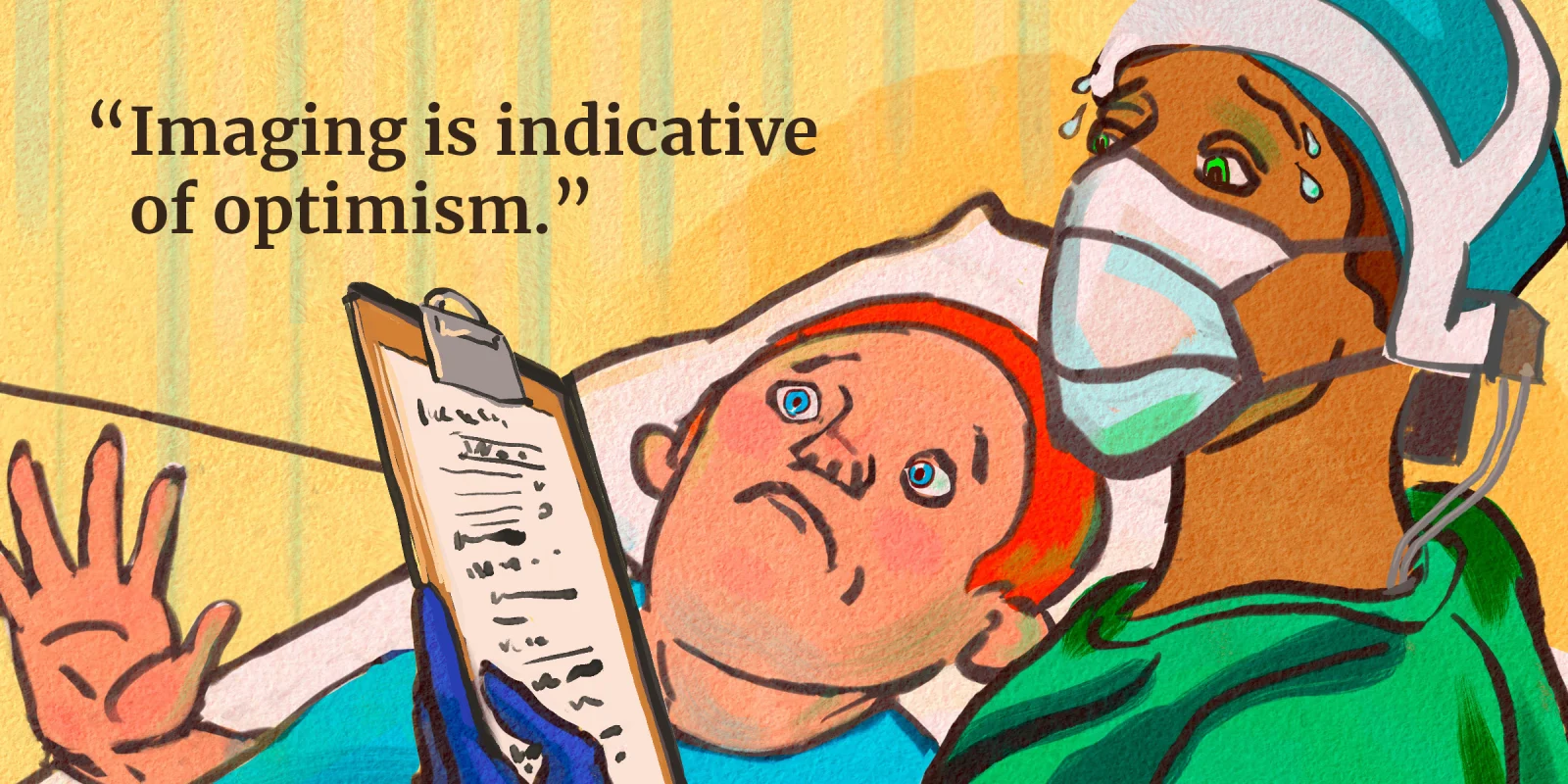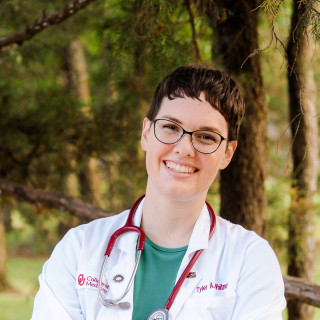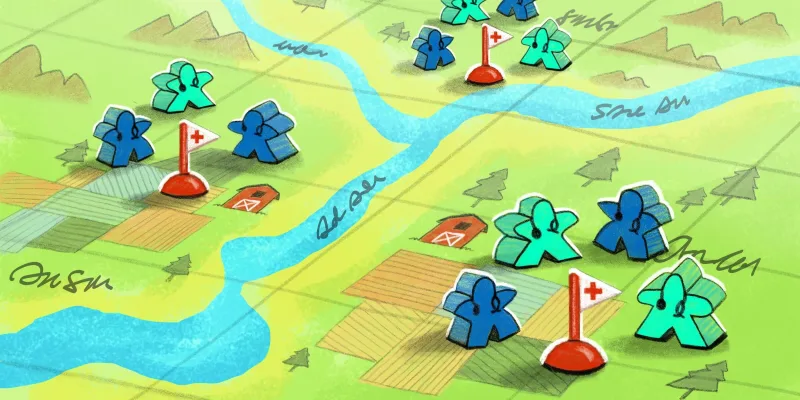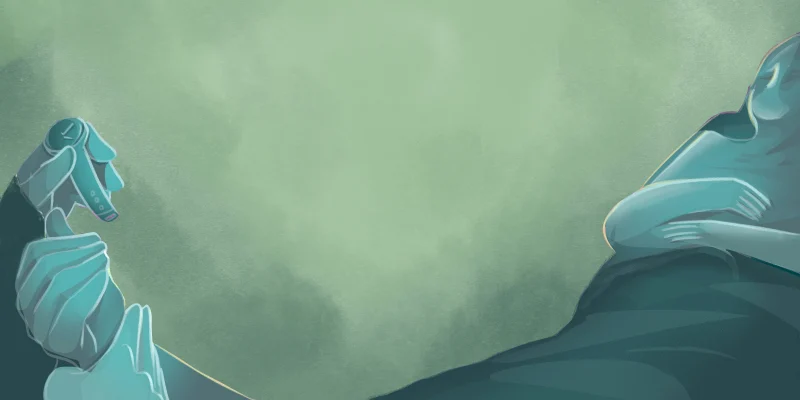This is part of the Medical Humanities series on Op-Med, which showcases creative work by Doximity members. Do you have a creative work related to your medical practice that you’d like to share? Send it to us here.
”The First Physical”
General:
Patient is in NAD,
except for being awoken at 7 a.m. by someone he has never met,
whose name badge,
unfortunately,
reads “STUDENT.”
HEENT:
His head seems fine to me.
Oh wait — that’s right: atraumatic/normocephalic.
Ears.
He has them.
EOMI.
I wonder if anyone else actually makes the patient stare at their finger
or if they just chart it.
I’m sure it’s not the first part of the exam that screams rookie.
Nose. Umm, it’s there?
No significant breakthroughs from the nose department.
Throat. I’ll be honest, I didn’t look.
Is it alright to assume it’s fine?
Neck:
No JVD.
Probably. Most likely.
All I see are muscles being stretched at my ridiculous request.
The 4L O2 NC discourages me from checking for carotid bruits.
He needs all the O2 he can get.
Me too.
CVS:
RRR.
Actually — it sounds weird to me. Not sure why,
Wait, no … normal, just slow.
To my knowledge, there are no M/R/G.
What even is a rub or gallop?
I’ll add that to the list of post-rounds googling.
Respiratory:
Oh no, we’ve come to the first abnormal finding.
Something sounds wrong on expiration.
But what? A wheeze?
Probably not, I remember that is the sound of asthma, and it doesn’t sound like that.
Crackles? That is what I’m going with, crackles.
Unfortunately, this means I cannot chart CTAB;
I looked up that abbreviation multiple times before it stuck in memory.
GI:
I ask if I can see his abdomen.
He replies, “Sure, you’re the doctor; it’s nothing you haven’t seen before.”
It makes me feel better that he isn’t weird about it.
I’m not weird about it either,
except that his belly is full of staples, an ostomy bag and tubes.
Goodness.
So what abdominal exam am I to perform?
What’s the line between a complete exam and causing unnecessary pain?
I forget auscultation and move on to palpation.
TTP. Everywhere?
Is there anywhere I can touch that doesn’t bring him pain this fine morning hour?
Percussion. Don’t even think about it.
One tap, and both of us are done with that.
I don’t apologize when I realize I did not properly drape the patient.
Luckily, he didn’t mind, and I’m already done.
But I will remember this mistake in the future, and aim to never repeat it.
Neuro:
AAOx3. Awake, alert, and oriented.
Well, he appears to be.
But wait, aren’t I supposed to ask him? His name, where we are and the date.
I asked him his name when I walked in. He also gave me his birthday, which I had no way to confirm.
He is accustomed to this hospital dance.
He knows where he is, and is tired of being here.
>He doesn’t know the exact date.
But the truth is I don’t either,
so anything close sounds acceptable to me.
I’ve always loved a pass/fail exam.
Skin:
I immediately see bruises.
Do all patients look this battered?
I look at his forearms,
>where a month of blood draws and IV lines leave their marks.
Do I chart that? Seems like an incidental finding.
No rashes.
But I didn’t really look at all of him,
so probably no rashes.
I probably shouldn’t write “probably” in his chart.
Extremities:
Edema is present.
Trace, 1+, 2+. I don’t really know.
I guess in the middle. 1+ it is.
I don’t remove his hospital socks.
Although I should never assume,
I doubt that they’re hiding anything.
Psych:
Ummm … what’s the psych test?
He doesn’t seem to have any problems. Normal.
Maybe I should just delete this line from my report,
so nobody even thinks to question me about it.
Assessment:
A 54/M with a litany of PMH and PSH is being evaluated by
a 24/F presenting to the OU hospital on her first day of internal medicine rotation.
Her PMH includes a year of not actually performing the physical exam because of a global pandemic.
>Labs are positive for high cortisol levels.
Imaging is indicative of optimism.
Ddx includes incompetence vs. lack of confidence vs. simply being a newbie.
Plan:
The plan is to learn from every patient encounter,
be there emotionally and physically for patients,
and not sacrifice my mental health in the process.
Gosh, I love being a medical student.
Disposition: MD
An interview with the poet
How did you come to write your poem?
This poem was written in response to a creative writing assignment during my internal medicine rotation. The prompt was to write about our most meaningful patient encounter. I took some artistic liberty. I was the only student to submit a poem, but my instructor liked it all the same and recommended I try to publish it. I do not have experience writing poetry. I wanted to do it in the format of a physical exam report, and I found that writing it more as a poem with line breaks in the middle of a sentence added to the humor and realism of how someone thinks about these things.
I knew I was not alone in stumbling through a physical exam; that was the inspiration to write this piece. Every MS3 probably has similar thoughts and insecurities with performing a physical. I wanted to write something other med students could relate to, and I also wanted to showcase the humor of the fine details we look for during a physical. Do we really check every patient's nose?
From the beginning I loved the idea of doing this poem in the stanza of a physical exam report. Moving into the assessment and plan just made sense and allowed me to bring some depth by exploring my own role in the encounter.
This piece was written one week into my internal medicine rotation, and it encapsulates my thoughts during the first physical on a real patient.
Tyler Whitney is a third-year med student at the University of Oklahoma Health Sciences Center. She hopes to one day become a developmental pediatrician and enhance the lives of patients and parents of those with exceptional abilities.
Illustration by Jennifer Bogartz and April Brust







